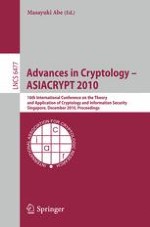2010 | OriginalPaper | Buchkapitel
Efficient Public-Key Cryptography in the Presence of Key Leakage
verfasst von : Yevgeniy Dodis, Kristiyan Haralambiev, Adriana López-Alt, Daniel Wichs
Erschienen in: Advances in Cryptology - ASIACRYPT 2010
Verlag: Springer Berlin Heidelberg
Aktivieren Sie unsere intelligente Suche, um passende Fachinhalte oder Patente zu finden.
Wählen Sie Textabschnitte aus um mit Künstlicher Intelligenz passenden Patente zu finden. powered by
Markieren Sie Textabschnitte, um KI-gestützt weitere passende Inhalte zu finden. powered by
We study the design of cryptographic primitives resistant to a large class of side-channel attacks, called “memory attacks”, where an attacker can repeatedly and adaptively learn information about the secret key, subject
only
to the constraint that the
overall amount
of such information is bounded by some parameter ℓ. Although the study of such primitives was initiated only recently by Akavia et al. [2], subsequent work already produced many such “leakage-resilient” primitives [48,4,42], including signature, encryption, identification (ID) and authenticated key agreement (AKA) schemes. Unfortunately, every existing scheme, — for any of the four fundamental primitives above, — fails to satisfy at least one of the following desirable properties:
Efficiency.
While the construction may be generic, it should have some
efficient
instantiations, based on standard cryptographic assumptions, and without relying on random oracles.
Strong Security
. The construction should satisfy the strongest possible definition of security (even in the presence of leakage). For example, encryption schemes should be secure against chosen
ciphertext
attack (CCA), while signatures should be
existentially
unforgeable.
Leakage Flexibility.
It should be possible to set the scheme parameters so that the leakage bound ℓ can come arbitrarily close to the secret-key size.
In this work we design the first signature, encryption, ID and AKA schemes which overcome these limitations, and satisfy all the properties above. Moreover, all our constructions are generic, in several cases elegantly simplifying and generalizing the prior constructions (which did not have any efficient instantiations). We also introduce several tools of independent interest, such as the abstraction (and constructions) of
true-simulation extractable
NIZK arguments, and a new
deniable
DH-based AKA protocol based on any CCA-secure encryption.
